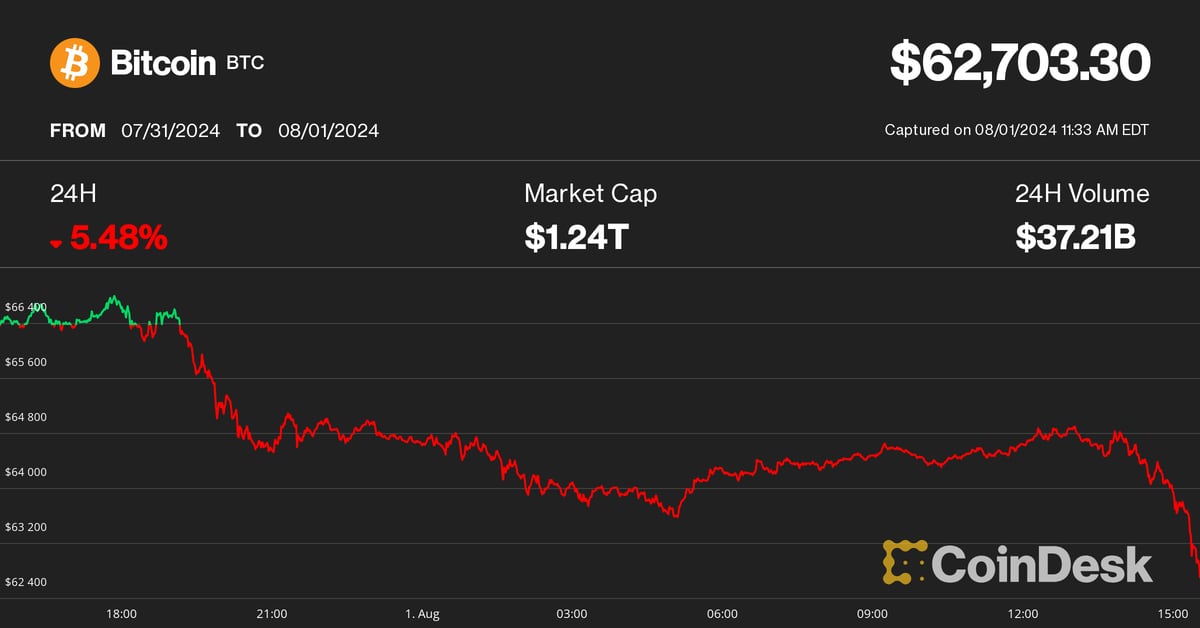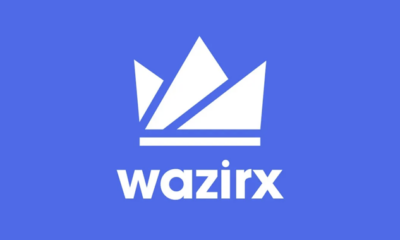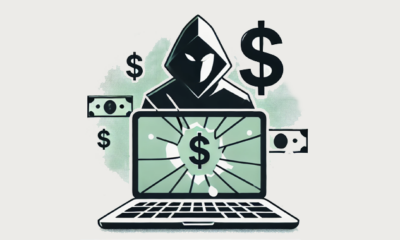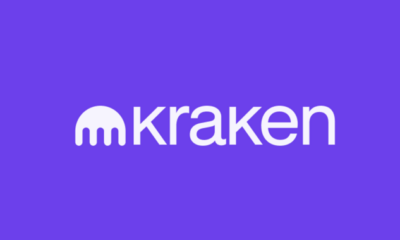Blockchain
Chinese Citizens Arrested for Laundering $73 Million in Pig Slaughter Crypto Scam

The US Department of Justice (DoJ) has charged two arrested Chinese nationals with allegedly orchestrating a hog slaughter scam that laundered at least $73 million from victims through shell companies.
The individuals, Daren Li, 41, and Yicheng Zhang, 38, were arrested in Atlanta and Los Angeles on April 12 and May 16, respectively.
The foreign nationals were “accused of conducting a fund laundering scheme amounting to at least $73 million related to an international cryptocurrency investment scam,” Deputy Attorney General Lisa Monaco said She said.
Prosecutors accused Li, Zhang and their co-conspirators of running an international syndicate that laundered funds obtained through cryptocurrency investment scams.
As part of the fraudulent operation, victims were allegedly tricked into transferring millions of dollars into U.S. bank accounts opened in the names of various shell companies.
“A network of money launderers then facilitated the transfer of those funds to other domestic and international bank accounts and cryptocurrency platforms in a manner designed to conceal the source, nature, ownership and control of the funds,” the DoJ.
The funds are believed to have been laundered through U.S. financial institutions into bank accounts in the Bahamas, then later converted into USDT or Tether and sent to cryptocurrency wallets, including one controlled by Li.
Specifically, Li and Zhang oversaw lower-level conspirators who transferred the proceeds overseas to bank accounts at Deltec Bank in the Bahamas. At least one of the bank accounts was operated with Li’s financial assistance, and Zhang also received victims’ funds directly, according to the unsealed indictment.
Both were charged with conspiracy to commit money laundering and six counts of international money laundering. If convicted, they face up to 20 years in prison on each charge.
Pig slaughter scams often involve scammers approaching wealthy, lonely targets using messaging apps, dating services and social media platforms to build trust and convince them to invest in different programs that claim to offer better returns, only to then transfer their money into wallets under their control.
In December 2023, the U.S. Govt announced charges against four citizens for their alleged participation in an illicit scheme that netted them more than $80 million through cryptocurrency investment scams.
Then last month, Google filed a lawsuit in the United States against two app developers based in Shenzhen and Hong Kong, respectively, for flooding the Play Store with fake crypto apps to carry out cryptocurrency theft using similar tactics.
Countries such as Burma, Cambodia, Laos, Malaysia, Myanmar and the Philippines have also emerged as countries hotbed of romance scamsoften luring unsuspecting people with promises of lucrative jobs to transport them to so-called “scam factories,” where they are forced to participate in the operation.
A recent report published by BBC News details how a 24-year-old Sri Lankan, recruited for a data entry job, was taken to Myawaddy, a town in southeastern Myanmar, and forcibly detained in a camp run by “Chinese-speaking mobsters”. .”
Furthermore, the individual, identified as Ravi (name changed), was tortured for refusing to participate, having his clothes torn off and electric shocks being given to his legs.
“I spent 16 days in cell for not obeying,” he said quoted as saying to the British broadcaster. “They only gave me water mixed with cigarette butts and ash to drink.”
In another case, a 21-year-old from the Indian state of Maharashtra was trafficked to Myanmar along with five other Indian men and two Filipino women in August 2022, but was eventually released after paying a ransom.
INTERPOL has described the situation as a fraud fueled by industrial-scale human trafficking, with the US State Department denouncing organized crime syndicates based in China for posing as labor brokers to recruit people with knowledge of English from Africa and Asia.
Two brothers arrested for stealing $25 million in new cryptocurrency heist
The development comes as the DoJ unsealed an indictment against Anton Peraire-Bueno, 24, of Boston, and James Pepaire-Bueno, 28, of New York, with conspiracy to commit wire fraud, wire fraud and conspiracy to commit money laundering. They each face a maximum sentence of 20 years in prison on each charge.
“The allegations in the indictment arise from an alleged new scheme by the defendants to exploit the very integrity of the Ethereum blockchain to fraudulently obtain approximately $25 million in cryptocurrency in approximately 12 seconds,” the DoJ said. She said.
The brothers, who studied at the Massachusetts Institute of Technology (MIT), would use their skills to carry out the new scheme in early April 2023 which involved a “first-of-its-kind manipulation” of the protocols underlying the blockchain Ethereum.
This allowed the defendants to fraudulently access pending transactions, alter the movement of electronic currency, and ultimately route $25 million in cryptocurrency from victims to their accounts through a series of transactions designed to obscure ownership of the stolen funds.
“Anton Peraire-Bueno and James Pepaire-Bueno manipulated and tampered with the process and protocols by which transactions are validated and added to the Ethereum blockchain,” the DoJ said, adding that they “meticulously planned” the attack for several months.
At the same time, they also took steps to cover their tracks by hiding their identities and hiding their ill-gotten gains by creating shell companies, private cryptocurrency addresses, and foreign cryptocurrency exchanges. THE MEV-Boost the vulnerability exploited to compromise the integrity of the Ethereum blockchain was subsequently corrected.
“The Peraire-Bueno brothers stole $25 million in Ethereum cryptocurrency through a technologically sophisticated and cutting-edge scheme that they planned for months and executed in seconds,” Monaco said. “As cryptocurrency markets continue to evolve, the Department will continue to root out fraud, support victims, and restore confidence in these markets.”
Did you find this article interesting? Follow us on Twitter AND LinkedIn to read the most exclusive content we publish.
Fuente
Blockchain
Bitcoin (BTC) Price Crashes as Donald Trump’s Win Odds Dip

Markets received nominally good news on Thursday morning, with the US ISM manufacturing PMI for July falling much more than economists expected, sending interest rates to multi-month lows across the board. Additionally, initial jobless claims in the US jumped to their highest level in about a year. Taken together, the data adds to the sentiment that the US is on the verge of a cycle of monetary easing by the Federal Reserve, which is typically seen as bullish for risk assets, including bitcoin.
Blockchain
Terra Blockchain Reboots After Reentry Attack Leads to $4M Exploit

Please note that our Privacy Policy, terms of use, cookiesAND do not sell my personal information has been updated.
CoinDesk is a awarded press agency that deals with the cryptocurrency sector. Its journalists respect a rigorous set of editorial policiesIn November 2023, CoinDesk has been acquired from the Bullish group, owner of Bullisha regulated digital asset exchange. Bullish Group is majority owned by Block.one; both companies have interests in a variety of blockchain and digital asset businesses and significant digital asset holdings, including bitcoin. CoinDesk operates as an independent subsidiary with an editorial board to protect journalistic independence. CoinDesk employees, including journalists, are eligible to receive options in the Bullish group as part of their compensation.
Blockchain
$6.8M Stolen, ASTRO Collapses 60%

In the latest news in the blockchain industry, there has been a turn of events that has severely affected Terra and its users and investors, with the company losing $6.8 million. The attack, which exploited a reentry vulnerability in the network’s IBC hooks, raises questions about the security measures of the once celebrated blockchain protocol.
A web3 security company, Cyvers Alerts reported that the exploit occurred on July 31st and caused the company to lose 60 million ASTRO, 3.5 million USDC500,000 USDTand 2. 7 BitcoinThe flaw was discovered in April and allows cybercriminals to make payments non-stop by withdrawing money from the network.
Earth’s response
Subsequently, to the hack employed on the Terra blockchain, its official X platform declared the Suspension network operations for a few hours to apply the emergency measure. Finally in its sendTerra’s official account agreed, sharing that its operations are back online: the core transactions that make up the platform are now possible again.
However, the overall value of the various assets lost in the event was unclear.
Market Impact: ASTRO Crashes!
The hack had an immediate impact on the price of ASTRO, which dropped nearly 60% to $0.0206 following the network shutdown. This sharp decline highlights the vulnerability of token prices to security breaches and the resulting market volatility.
This incident is not the first time Terra has faced serious challenges. Earlier this year, the blockchain encountered significant problems that called into question its long-term viability. These repeated incidents underscore the need for stronger security measures to protect users’ assets and maintain trust in the network.
The recent Terra hack serves as a stark reminder of the ongoing security challenges in the blockchain space. As the platform works to regain stability, the broader crypto community will be watching closely.
Read also: Record Cryptocurrency Theft: Over $1 Billion Stolen in 2024
This is a major setback for Terra. How do you think this will impact the blockchain industry?
Blockchain
Luxembourg proposes updates to blockchain laws | Insights and resources

On July 24, 2024, the Ministry of Finance proposed Blockchain Bill IVwhich will provide greater flexibility and legal certainty for issuers using Distributed Ledger Technology (DLT). The bill will update three of Luxembourg’s financial laws, the Law of 6 April 2013 on dematerialised securitiesTHE Law of 5 April 1993 on the financial sector and the Law of 23 December 1998 establishing a financial sector supervisory commissionThis bill includes the additional option of a supervisory agent role and the inclusion of equity securities in dematerialized form.
DLT and Luxembourg
DLT is increasingly used in the financial and fund management sector in Luxembourg, offering numerous benefits and transforming various aspects of the industry.
Here are some examples:
- Digital Bonds: Luxembourg has seen multiple digital bond issuances via DLT. For example, the European Investment Bank has issued bonds that are registered, transferred and stored via DLT processes. These bonds are governed by Luxembourg law and registered on proprietary DLT platforms.
- Fund Administration: DLT can streamline fund administration processes, offering new opportunities and efficiencies for intermediaries, and can do the following:
- Automate capital calls and distributions using smart contracts,
- Simplify audits and ensure reporting accuracy through transparent and immutable transaction records.
- Warranty Management: Luxembourg-based DLT platforms allow clients to swap ownership of baskets of securities between different collateral pools at precise times.
- Tokenization: DLT is used to tokenize various assets, including real estate and luxury goods, by representing them in a tokenized and fractionalized format on the blockchain. This process can improve the liquidity and accessibility of traditionally illiquid assets.
- Tokenization of investment funds: DLT is being explored for the tokenization of investment funds, which can streamline the supply chain, reduce costs, and enable faster transactions. DLT can automate various elements of the supply chain, reducing the need for reconciliations between entities such as custodians, administrators, and investment managers.
- Issuance, settlement and payment platforms:Market participants are developing trusted networks using DLT technology to serve as a single source of shared truth among participants in financial instrument investment ecosystems.
- Legal framework: Luxembourg has adapted its legal framework to accommodate DLT, recognising the validity and enforceability of DLT-based financial instruments. This includes the following:
- Allow the use of DLT for the issuance of dematerialized securities,
- Recognize DLT for the circulation of securities,
- Enabling financial collateral arrangements on DLT financial instruments.
- Regulatory compliance: DLT can improve transparency in fund share ownership and regulatory compliance, providing fund managers with new opportunities for liquidity management and operational efficiency.
- Financial inclusion: By leveraging DLT, Luxembourg aims to promote greater financial inclusion and participation, potentially creating a more diverse and resilient financial system.
- Governance and ethics:The implementation of DLT can promote higher standards of governance and ethics, contributing to a more sustainable and responsible financial sector.
Luxembourg’s approach to DLT in finance and fund management is characterised by a principle of technology neutrality, recognising that innovative processes and technologies can contribute to improving financial services. This is exemplified by its commitment to creating a compatible legal and regulatory framework.
Short story
Luxembourg has already enacted three major blockchain-related laws, often referred to as Blockchain I, II and III.
Blockchain Law I (2019): This law, passed on March 1, 2019, was one of the first in the EU to recognize blockchain as equivalent to traditional transactions. It allowed the use of DLT for account registration, transfer, and materialization of securities.
Blockchain Law II (2021): Enacted on 22 January 2021, this law strengthened the Luxembourg legal framework on dematerialised securities. It recognised the possibility of using secure electronic registration mechanisms to issue such securities and expanded access for all credit institutions and investment firms.
Blockchain Act III (2023): Also known as Bill 8055, this is the most recent law in the blockchain field and was passed on March 14, 2023. This law has integrated the Luxembourg DLT framework in the following way:
- Update of the Act of 5 August 2005 on provisions relating to financial collateral to enable the use of electronic DLT as collateral on financial instruments registered in securities accounts,
- Implementation of EU Regulation 2022/858 on a pilot scheme for DLT-based market infrastructures (DLT Pilot Regulation),
- Redefining the notion of financial instruments in Law of 5 April 1993 on the financial sector and the Law of 30 May 2018 on financial instruments markets to align with the corresponding European regulations, including MiFID.
The Blockchain III Act strengthened the collateral rules for digital assets and aimed to increase legal certainty by allowing securities accounts on DLT to be pledged, while maintaining the efficient system of the 2005 Act on Financial Collateral Arrangements.
With the Blockchain IV bill, Luxembourg will build on the foundations laid by previous Blockchain laws and aims to consolidate Luxembourg’s position as a leading hub for financial innovation in Europe.
Blockchain Bill IV
The key provisions of the Blockchain IV bill include the following:
- Expanded scope: The bill expands the Luxembourg DLT legal framework to include equity securities in addition to debt securities. This expansion will allow the fund industry and transfer agents to use DLT to manage registers of shares and units, as well as to process fund shares.
- New role of the control agent: The bill introduces the role of a control agent as an alternative to the central account custodian for the issuance of dematerialised securities via DLT. This control agent can be an EU investment firm or a credit institution chosen by the issuer. This new role does not replace the current central account custodian, but, like all other roles, it must be notified to the Commission de Surveillance du Secteur Financier (CSSF), which is designated as the competent supervisory authority. The notification must be submitted two months after the control agent starts its activities.
- Responsibilities of the control agent: The control agent will manage the securities issuance account, verify the consistency between the securities issued and those registered on the DLT network, and supervise the chain of custody of the securities at the account holder and investor level.
- Simplified payment processesThe bill allows issuers to meet payment obligations under securities (such as interest, dividends or repayments) as soon as they have paid the relevant amounts to the paying agent, settlement agent or central account custodian.
- Simplified issuance and reconciliationThe bill simplifies the process of issuing, holding and reconciling dematerialized securities through DLT, eliminating the need for a central custodian to have a second level of custody and allowing securities to be credited directly to the accounts of investors or their delegates.
- Smart Contract Integration:The new processes can be executed using smart contracts with the assistance of the control agent, potentially increasing efficiency and reducing intermediation.
These changes are expected to bring several benefits to the Luxembourg financial sector, including:
- Fund Operations: Greater efficiency and reduced costs by leveraging DLT for the issuance and transfer of fund shares.
- Financial transactions: Greater transparency and security.
- Transparency of the regulatory environment: Increased attractiveness and competitiveness of the Luxembourg financial centre through greater legal clarity and flexibility for issuers and investors using DLT.
- Smart Contracts: Potential for automation of contractual terms, reduction of intermediaries and improvement of transaction traceability through smart contracts.
Blockchain Bill IV is part of Luxembourg’s ongoing strategy to develop a strong digital ecosystem as part of its economy and maintain its status as a leading hub for financial innovation. Luxembourg is positioning itself at the forefront of Europe’s growing digital financial landscape by constantly updating its regulatory framework.
Local regulations, such as Luxembourg law, complement European regulations by providing a more specific legal framework, adapted to local specificities. These local laws, together with European initiatives, aim to improve both the use and the security of projects involving new technologies. They help establish clear standards and promote consumer trust, while promoting innovation and ensuring better protection against potential risks associated with these emerging technologies. Check out our latest posts on these topics and, for more information on this law, blockchain technology and the tokenization mechanism, do not hesitate to contact us.
We are available to discuss any project related to digital finance, cryptocurrencies and disruptive technologies.
This informational piece, which may be considered advertising under the ethics rules of some jurisdictions, is provided with the understanding that it does not constitute the rendering of legal or other professional advice by Goodwin or its attorneys. Past results do not guarantee a similar outcome.
-

 Regulation8 months ago
Regulation8 months agoNancy Pelosi Considers Supporting Republican Crypto Bill FIT21 – London Business News
-

 Regulation10 months ago
Regulation10 months agoRipple CTO and Cardano founder clash over XRP’s regulatory challenges ⋆ ZyCrypto
-

 Videos10 months ago
Videos10 months agoCryptocurrency News: Bitcoin, ETH ETF, AI Crypto Rally, AKT, TON & MORE!!
-

 Regulation9 months ago
Regulation9 months agoBitcoin’s future is ‘bleak’ and ripe for regulation, says lead developer
-

 News9 months ago
News9 months agoThe trader earned $46 million with PEPE after reaching a new ATH
-

 News7 months ago
News7 months agoAave Price Increases Following Whales Accumulation and V3.1 Launch
-

 Regulation7 months ago
Regulation7 months agoSouth Korea Imposes New ‘Monitoring’ Fees on Cryptocurrency Exchanges
-

 Regulation7 months ago
Regulation7 months agoA Blank Sheet for Cryptocurrencies: Kamala Harris’ Regulatory Opportunity
-

 Regulation7 months ago
Regulation7 months agoCryptocurrency Regulations in Slovenia 2024
-

 Regulation9 months ago
Regulation9 months ago🔒 Crypto needs regulation to thrive: Tyler Cowen
-

 Blockchain9 months ago
Blockchain9 months agoSolana ranks the fastest blockchain in the world, surpassing Ethereum, Polygon ⋆ ZyCrypto
-

 Blockchain9 months ago
Blockchain9 months agoSolana Surpasses Ethereum and Polygon as the Fastest Blockchain ⋆ ZyCrypto



















